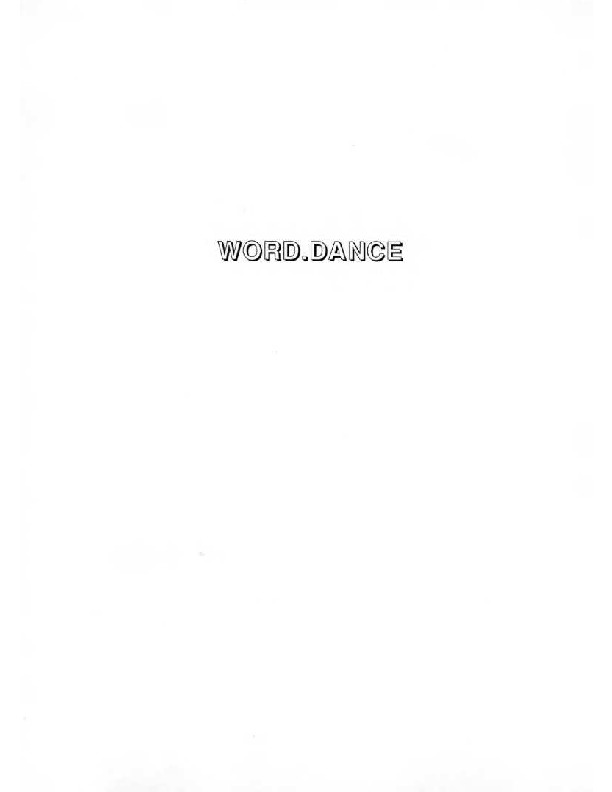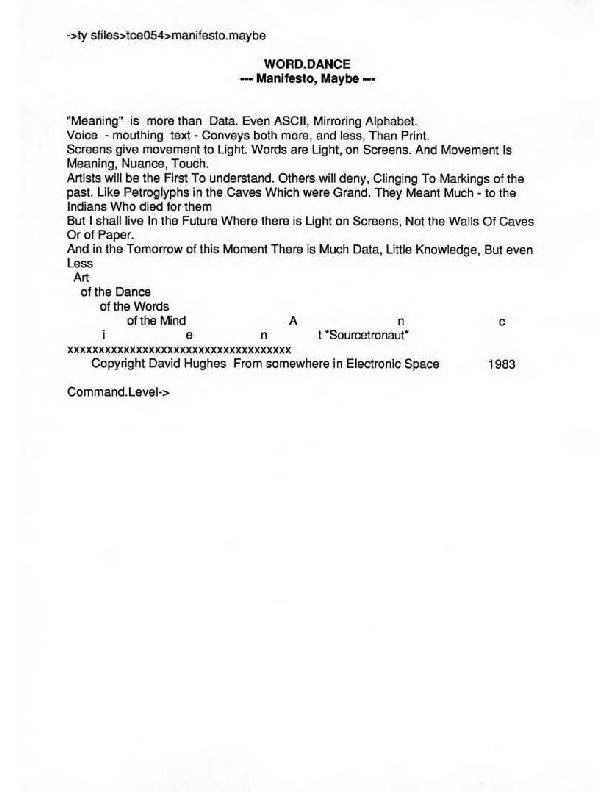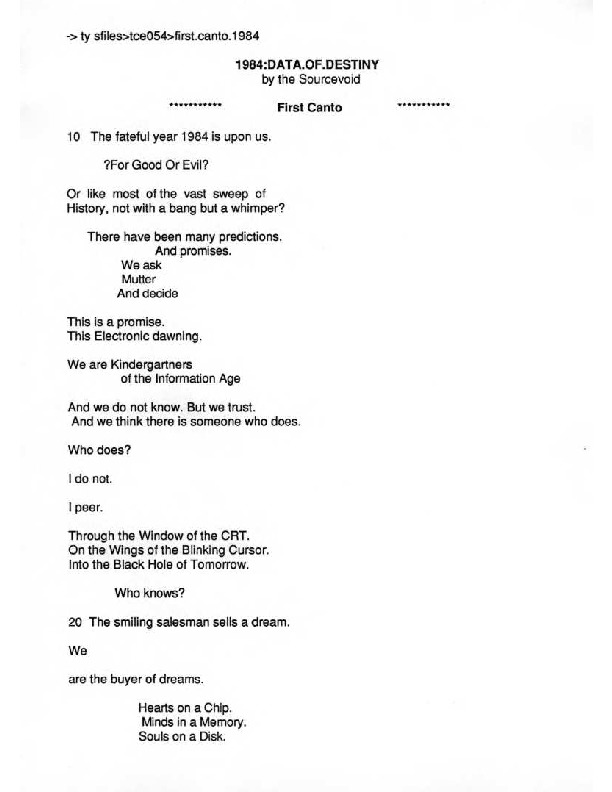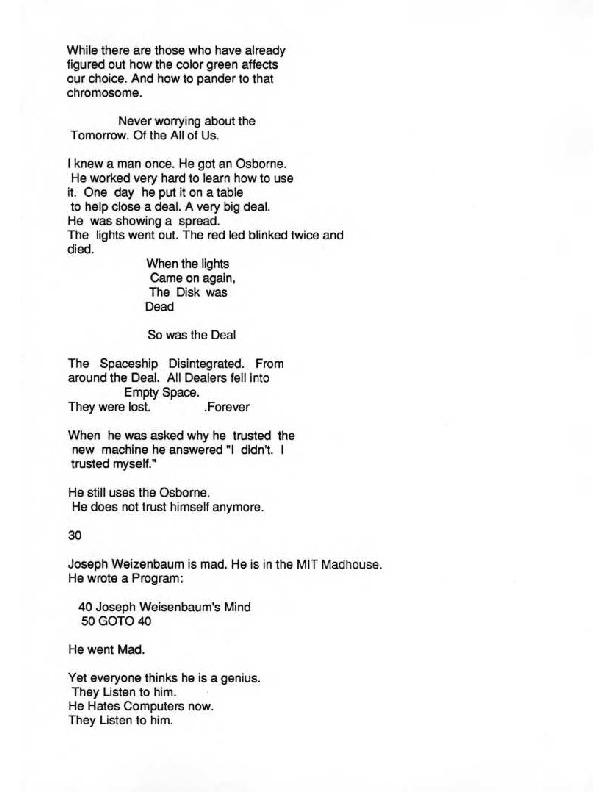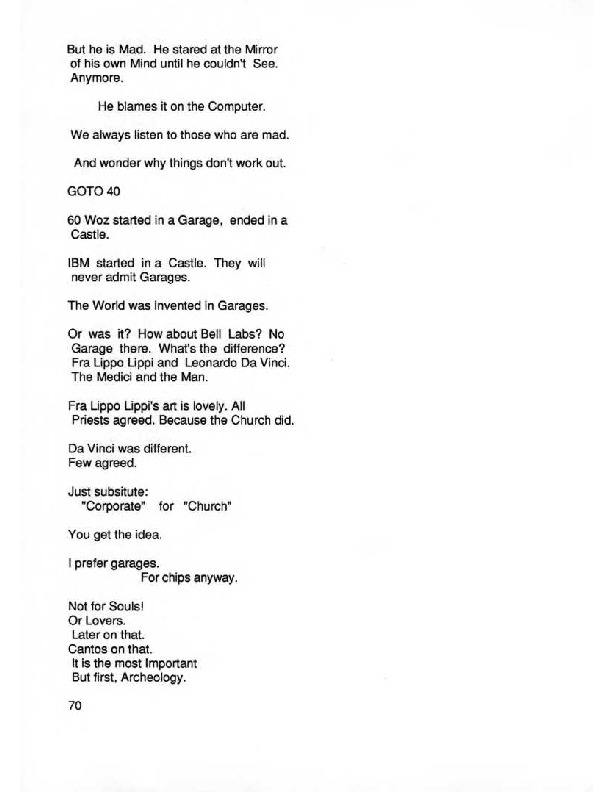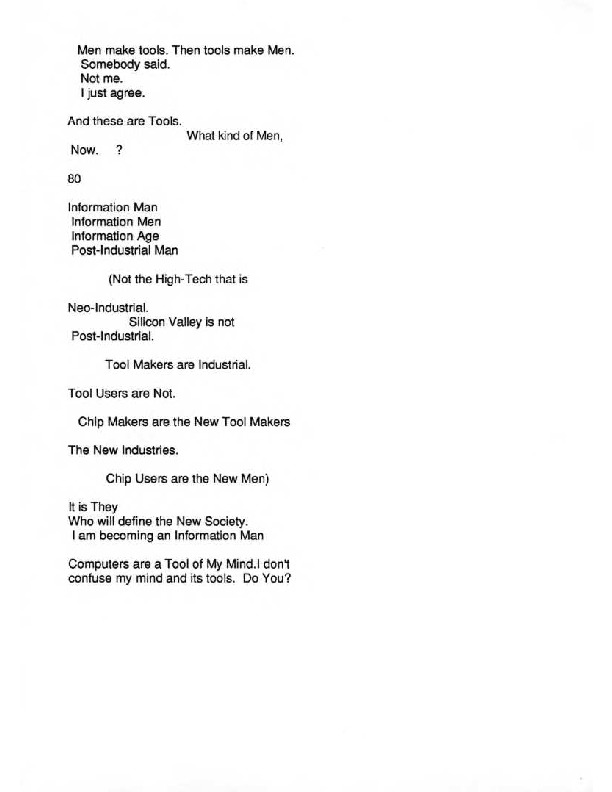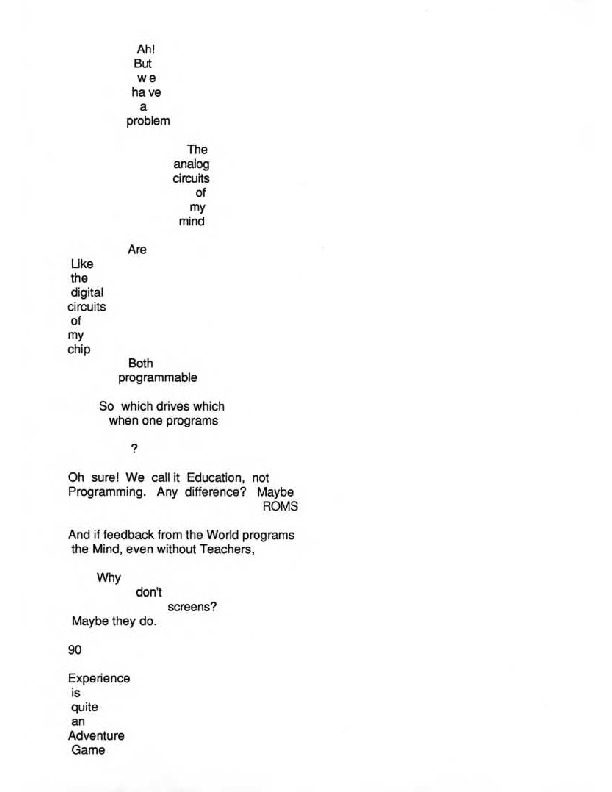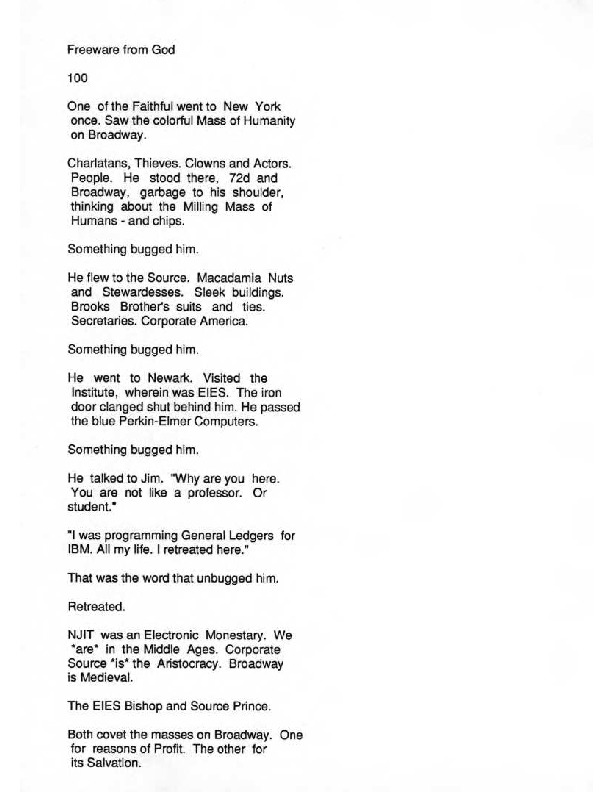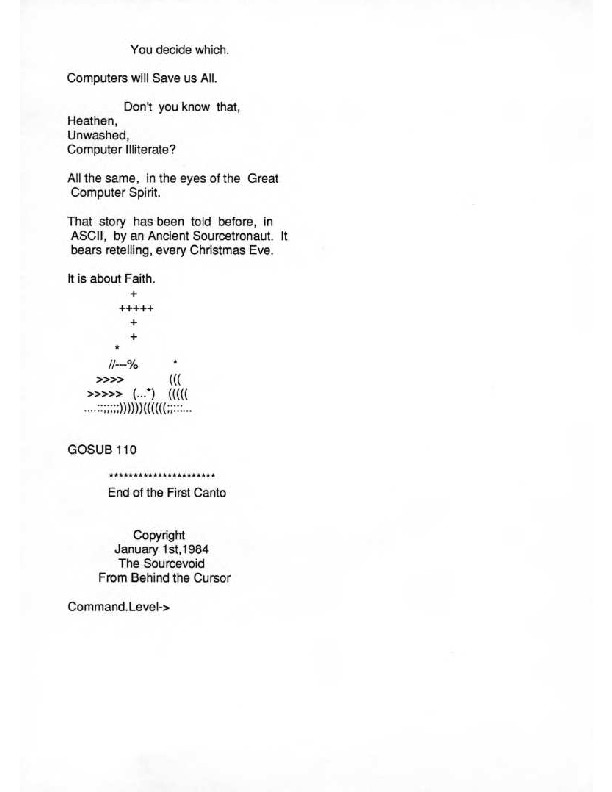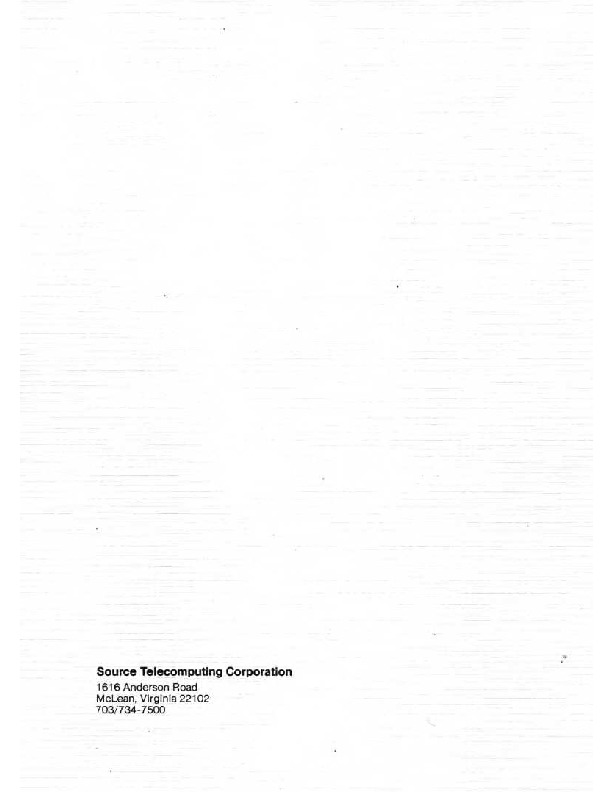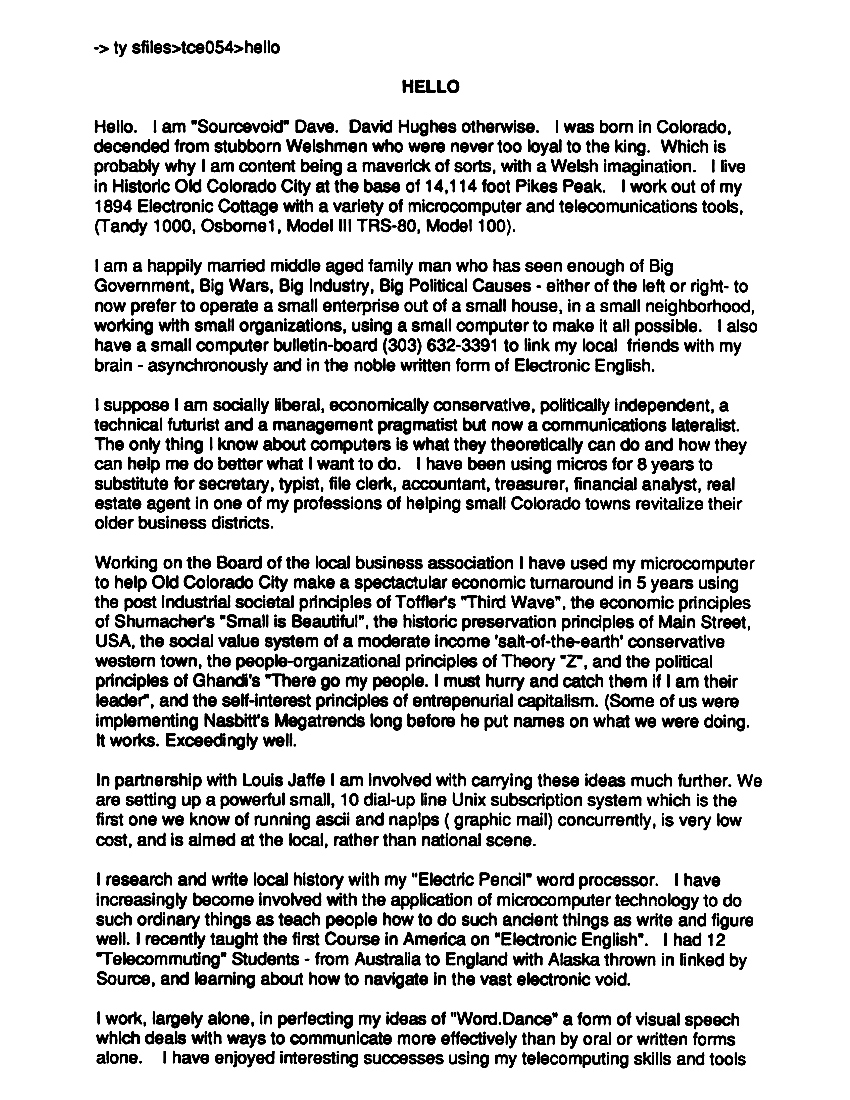- Details
- Written by david
- Category: WordDance
- Hits: 1222
https://www.atariarchives.org/deli/on-line_publishing.php
ON-LINE
PUBLISHING AND
THE WORD DANCE
David R. Hughes, Sr.
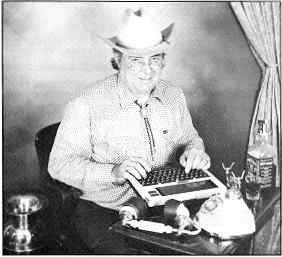
Publishing to go: David R. Hughes and his
bulletin board system on a portable computer.
Dave R. Hughes, Sr., often resides in electronic space, from which he communes with the networked multitudes. He dances the Charleston.
When a computer display suddenly begins to scroll a screenful of text from the bottom up, someone new to the computer world will try to read from the top down. This novel reading experience often produces anxiety, if not outright panic. It can be very disconcerting for those habituated to a lifetime of reading printed lines of obedient text that sit still on the page to try to read words that jerk, jump, scroll, move and eventually wander off the top of the screen into electronic oblivion.
But behind that peculiar motion of words in the form of light may be the genesis of a new form of human expression. The Word Dance. It is my contention that this electronic mode of writing-and reading-differs enough from the present mode to make it worthy of our fullest attention.
The computer screen is as different from the printed page as the printed page is from oral language. If I speak to you in person, or over the phone, I do not punctuate my remarks by saying aloud "comma," "question mark," "period." Why? Because my voice is dynamic. Controlling the rate of word flow from my mouth to your ear, I can pause, stop, change pitch and otherwise modulate my voice so that I can communicate much more to you than if I-or C3PO-simply uttered the sounds of the same words in a monotone and with the words evenly spaced.
But when man first reduced oral language to a written form, he faced limitations imposed by the sheer number of variations the human voice could give the delivery of a "word" compared with the bare bones appearance of it in print. As he put the symbol for one sound, or element, on the cave wall, he had to put the next one next to it, not on top of the first one. To telescope a few million years of linguisitic development to a phrase or two, we went left to right, the Chinese went right to left and the Arabs chose to go up and down. We call it Writing.
But then, in an effort to represent some of the common variations the voice can deliver, such as pauses, halts, interrogations, he had to invent commas, periods, question marks. Nothing more, as far as I am concerned, than code. A program. Basic English. Which makes poets programmers, as they use the conventions of line length, punctuation and other devices to make things happen in their head. The same words arranged in any other fashion would not create the same effect.
A reader, guided by his central processor brain, moves the input device of his eye over fixed and static lines of text in a prescribed manner, decoding commas into pauses, for example. The words do not move; the eyes do. Not in any natural way, but as they have been trained to move after years of what only can be called a form of programming known as learning to read.
And yet the computer screen is dynamic! Paper is static. On the computer screen it is possible to arrange things so that the eye stays still and the words move. One can bring a string of words to a point on the screen where the eye is looking, unmoving, and keep putting new words there. Word Dance.
And we can pause. Without a comma. We may not need the same punctuation on screens that we do on paper. Or many of the other "writing" devices. We can discover, invent, or simply develop as a people in the same fashion most language has evolved, many of the dynamic-screen brain equivalents brought in by voice. There are already a few. Many on-line chatterers use an asterisk before and after a word typed in to give the entire word emphasis, on the screen. Others resort to a dynamic mixture of upper and lower case. Yet others prewrite expressive phrases and "upload" at three hundred words a minute rather than keying away at thirty words a minute when chatting with another.
Whether in the midst of a chat, or a formal, realtime "electure" or in prepared pieces, the electronic writer or speaker can give his text some of the nuance, pacing and emphasis of oral speech. The words can be scattered all over the screen. They can move. They can have size, shape and intensity. From garish op art to very subtle effects, such as one word in a static paragraph blinking slowly. A computer writer can speak with the tongue of the fingers for the ear of the eye.
I simply cannot demonstrate Word Dance on paper. Else it would not be Word Dance. It can only exist on screens-where, I think, the eyes of the vast majority of the people in technically advanced nations will soon be. You would have to dial up my Sourcetrek electronic magazine on the Source, type PUBLIC152 DIRECT and once in the magazine select something like "The Rubáiyát Debunked," where-depending on the way your terminal handles things-you would get a dynamically presented piece of Word Dance.
In the future, Word Dancers will be able to add color graphics using the coming Protocols of the PLP videotext standard adopted by AT&T to permit unalike computers to send and receive color graphics. One will dynamically illustrate and embellish the Word Dance flow of text, perhaps with sound, and thus bring to the act of individual creative composition the whole range of literary, artistic and musical skills, which can then be flung outward on the wings of the blinking cursor to the waiting stars.
Where will it all end? I don't know. I am just beginning.
| WORD.DANCE -Manifesto Maybe- Meaning Is more than Data, Even ASCII, Mirroring Alphabet. Voice, Mouthing text, Conveys both more, And less Than Print. Screens give movement To Light. Words Are Light On Screens. And Movement Is Meaning, Nuance, Touch. Artists Will be the First To Understand. Others will deny, clinging To Markings of the past Like Petroglyphs in the Caves Which were Grand. They Meant much To the Indians Who died for them. But I shall live In the Future Where there is Light On Screens Not the Walls of Caves Or Paper For in the Tomorrow of this Moment There is Much Data, Little Knowledge, Some Wisdom But even Less Art of the
Dance of the Words of the Mind D.R.H., SR. |
www.atariarchives.org
